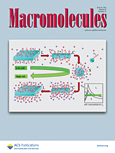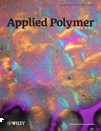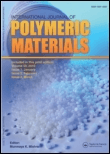
MACROMOLECULES
Scope & Guideline
Pioneering Research in High-Performance Polymers
Introduction
Aims and Scopes
- Polymer Synthesis and Characterization:
The journal emphasizes novel synthetic methodologies for creating a wide range of polymers, including biopolymers, and the detailed characterization of their physical, chemical, and biological properties. - Biomaterials and Biomedical Applications:
A core focus is on the development and application of polymeric materials in biomedical contexts, including drug delivery systems, tissue engineering scaffolds, and bioactive materials. - Sustainable and Green Chemistry:
The journal promotes research on sustainable materials and processes, including the use of renewable resources, biodegradable polymers, and environmentally friendly synthesis methods. - Nanotechnology and Functional Materials:
Research related to the design and application of nanostructured materials, including nanocomposites, nanoparticles, and their interactions with biological systems, is a significant area of interest. - Responsive and Adaptive Materials:
The journal covers the development of smart materials that respond to environmental stimuli (e.g., pH, temperature, light) for applications in drug delivery, sensors, and actuators.
Trending and Emerging
- Biodegradable and Biobased Polymers:
Research into biodegradable and biobased polymers is rapidly increasing, driven by the need for sustainable materials that can mitigate environmental impact. - Smart and Responsive Materials:
There is a growing interest in smart materials that respond to external stimuli, such as pH, temperature, and light, for applications in drug delivery, sensors, and adaptive systems. - Nanomedicine and Targeted Therapies:
The integration of nanotechnology in drug delivery systems, particularly for targeted therapies and cancer treatment, is a prominent trend reflecting advances in personalized medicine. - Polymer-based Biomaterials:
The development of polymeric biomaterials for medical applications, including tissue engineering and regenerative medicine, is increasingly popular, showcasing the intersection of polymer science and biology. - Advanced Characterization Techniques:
There is a notable trend towards the application of advanced characterization techniques, including in situ and real-time monitoring methods, to better understand polymer behavior and interactions.
Declining or Waning
- Traditional Synthetic Polymers:
There is a noticeable decline in papers focusing solely on traditional synthetic polymers without functionalization or innovative applications, as the field shifts towards more advanced and functional materials. - Basic Polymer Physics:
Research that primarily addresses fundamental aspects of polymer physics without direct application to new technologies or materials is becoming less frequent, as the focus shifts towards applied research. - Conventional Drug Delivery Systems:
The exploration of conventional drug delivery systems without novel modifications or materials is waning, likely due to increased interest in more sophisticated and targeted delivery mechanisms. - Single-Component Polymer Systems:
Research on single-component polymer systems is declining in favor of more complex formulations that integrate multiple components or functionalities for enhanced performance. - Static Characterization Techniques:
There is a decreasing emphasis on purely static characterization methods, with a trend towards dynamic and in situ analysis techniques that provide more relevant insights into material behavior.
Similar Journals

MACROMOLECULAR RESEARCH
Pioneering Research in Polymer ApplicationsMACROMOLECULAR RESEARCH, published by the POLYMER SOC KOREA, is a premier journal dedicated to advancing the field of macromolecular science and polymer engineering. With its ISSN 1598-5032 and E-ISSN 2092-7673, this journal has emerged as a vital platform for researchers and professionals interested in the application and development of polymers across various domains. Based in South Korea and operating as an open-access resource since its inception in 2002, MACROMOLECULAR RESEARCH consistently ranks in the Q2 category across diverse fields such as Chemical Engineering, Materials Chemistry, and Organic Chemistry as per the latest 2023 metrics. Notably, it is recognized for its substantial contributions to polymery science, increasing its visibility and impact in global research. By providing a forum for original research articles, reviews, and innovative methodologies, this journal aims to foster collaboration and knowledge sharing among scientists, engineers, and students alike. Join a community that is at the forefront of polymer research by exploring the wealth of resources and cutting-edge studies featured in MACROMOLECULAR RESEARCH.

ACS Materials Au
Transforming Ideas into Materials BreakthroughsACS Materials Au, published by the American Chemical Society, is a premier open-access journal that has been at the forefront of materials science since its inception in 2021. With an ISSN of 2694-2461, this journal encompasses an expansive range of topics including biomaterials, electronic, optical and magnetic materials, materials chemistry, and polymers and plastics, consistently achieving Q1 rankings in these categories for 2023. The journal is based in the United States and operates from the AMS's headquarters in Washington, DC, offering significant visibility and a robust platform for researchers. The journal's commitment to open access ensures wide dissemination of groundbreaking research, enabling a diverse audience—including researchers, professionals, and students—to engage with the latest advancements in materials science. With an encouraging impact factor and a focus on novel materials and innovative applications, ACS Materials Au stands as a vital resource for anyone devoted to understanding and advancing the frontiers of materials engineering and science.

JOURNAL OF APPLIED POLYMER SCIENCE
Connecting Theory with Practice in Polymer ScienceThe Journal of Applied Polymer Science, published by Wiley, is a leading journal in the field of polymer science, showcasing innovative research and applications in various domains since its inception in 1959. With an ISSN of 0021-8995 and an E-ISSN of 1097-4628, it is indexed in prominent databases, maintaining a strong presence with Scopus rankings placing it in the Q2 category across multiple disciplines, including Chemistry, Materials Chemistry, and Polymers and Plastics. The journal’s commitment to advancing scientific knowledge is reflected in its impact on the materials science community, with noteworthy rankings such as #38 in Surfaces, Coatings and Films and #51 in Polymers and Plastics. Though not an open-access publication, it remains a vital resource for researchers, professionals, and students aiming to deepen their understanding of polymer applications and to stay abreast of the latest developments in this ever-evolving field. With a focus on high-quality research, the Journal of Applied Polymer Science continues to be a cornerstone for those engaged in polymer research and its myriad applications.

INTERNATIONAL JOURNAL OF POLYMER ANALYSIS AND CHARACTERIZATION
Championing excellence in polymer analysis and characterization.International Journal of Polymer Analysis and Characterization is a distinguished scholarly publication dedicated to the field of polymer science, with a focus on innovative methodologies and significant advances in the analysis and characterization of polymeric materials. Published by Taylor & Francis Ltd in the United Kingdom, this journal serves as a vital resource for researchers, professionals, and students deeply engaged in Analytical Chemistry, Chemical Engineering, and Polymer Science. With a convergence spanning from 1995 to 2024, it holds a Q3 ranking in the 2023 category quartiles for its valuable contributions to the fields of Analytical Chemistry, Chemical Engineering, and Polymers and Plastics. Despite being a non-open access publication, its rigorous peer-review process and comprehensive coverage of current trends ensure that the journal remains a crucial platform for disseminating impactful research. The journal is indexed in various databases, underscoring its relevance and quality in the academic community. Exploratory studies and articles that push the boundaries of polymer analysis find a welcoming home within these pages, making it an essential read for those aiming to stay at the forefront of polymer research.

Polymer Reviews
Unveiling the complexities of polymer technology.Polymer Reviews, published by Taylor & Francis Inc, is an esteemed journal dedicated to the intricate and evolving field of polymer science. With its ISSN 1558-3724 and E-ISSN 1558-3716, the journal has established a significant presence among researchers and practitioners alike, evidenced by its impressive categorization in the Q1 quartiles across multiple disciplines, including Biomedical Engineering, Materials Chemistry, and Renewable Energy. Since its inception in 2006 and continuing through 2024, Polymer Reviews has consistently aimed to advance the knowledge base of polymer applications and innovations, providing a platform for comprehensive review articles that stimulate further research and inspire practical solutions. The journal, ranking within the top percentile across several Scopus categories, underscores its impact and relevance in a rapidly developing scientific landscape. Though not an open-access journal, it remains a vital resource for those invested in the future of materials science and engineering.

Polymers
Driving forward-thinking research in polymer chemistry.Polymers is a premier journal published by MDPI, dedicated to advancing the field of polymer science and technology. This open-access journal, established in 2009, has quickly gained prominence in the academic community, serving as a vital platform for disseminating high-quality research articles, reviews, and communications in the realms of chemistry, polymers, and plastics. Based in Switzerland, with an impressive ranking in the Q1 quartile for both Chemistry and Polymer studies, Polymers boasts a significant impact factor, reflecting its rigorous peer-review process and esteemed editorial board. Researchers, professionals, and students alike benefit from the broad accessibility of content, allowing for a more extensive reach and engagement within the scientific community. As a key resource for the latest advancements and innovations in polymer research, Polymers continues to lead discussions, inspire collaborations, and foster the development of novel materials that shape various industrial applications.

MRS Advances
Charting New Territories in Physics and EngineeringMRS Advances, published by Springer Heidelberg, is an esteemed academic journal that serves as a vital platform for disseminating cutting-edge research in the fields of condensed matter physics, materials science, and mechanical engineering. With an ISSN of 2731-5894 and an E-ISSN of 2059-8521, the journal is hosted in Switzerland and encompasses an impressive spectrum of innovative studies that impact both theoretical and practical applications. Throughout its converged years from 2012 and continuing through 2024, MRS Advances has established itself with notable rankings, including Q4 in condensed matter physics and Q3 in several related categories. This journal not only enriches the academic community with its rigorous peer-reviewed articles, but also encourages open discussions that further advance research innovations. Although currently not designated as an open-access journal, its accessibility through institutional subscriptions ensures that professionals, researchers, and students can engage with the latest advancements in the material science arena. Emphasizing its relevance, MRS Advances is dedicated to fostering interdisciplinary collaboration and inspiring new discoveries within the global research community.

International Journal of Polymeric Materials and Polymeric Biomaterials
Transforming Ideas into Polymeric ApplicationsThe International Journal of Polymeric Materials and Polymeric Biomaterials, published by Taylor & Francis AS, stands at the forefront of materials science, showcasing groundbreaking research in the fields of Analytical Chemistry, Chemical Engineering, and Polymeric Materials. With an ISSN of 0091-4037 and an E-ISSN of 1563-535X, this esteemed journal, established in 1971, serves as a vital platform for academics and professionals seeking to disseminate innovative findings and elevate the understanding of polymeric materials. Featuring a commendable impact factor and ranking in the top quartiles of its categories—Q2 in Analytical Chemistry, Chemical Engineering, and Polymers and Plastics—the journal is a pivotal resource for researchers aiming to leverage polymer science in various applications. Although it does not offer open access, its rigorous peer-review process ensures that only high-quality research is published, making it an essential reference for anyone involved in polymer research and development.

MACROMOLECULAR BIOSCIENCE
Transforming Theoretical Insights into Practical ApplicationsMACROMOLECULAR BIOSCIENCE, published by WILEY-V C H VERLAG GMBH, is a leading journal in the fields of bioengineering, biomaterials, biotechnology, materials chemistry, and polymers and plastics. With a convergence of scientific inquiry since its inception in 2001, the journal has established itself as a vital resource for researchers and professionals exploring the interface of molecular sciences and biosystems. It boasts impressive Scopus rankings, including Q1 status in multiple categories, reflecting its significant contribution to advancing knowledge and innovation in the polymer and biomaterials domains. While the journal does not currently offer open access options, its rigorous peer-review process ensures the publication of high-quality research that fuels academic discourse. Positioned in Weinheim, Germany, MACROMOLECULAR BIOSCIENCE aims to bridge theoretical understanding with practical applications, making it an essential reference for students, academics, and industry practitioners dedicated to the evolving landscape of macromolecular bioscience.

Materials Today Advances
Advancing the frontiers of materials science and engineering.Materials Today Advances is a premier open access journal, published by Elsevier, dedicated to disseminating cutting-edge research in the fields of Materials Science and Mechanical Engineering. Since its inception in 2019, the journal has quickly established itself within the academic community, achieving an impressive Q1 quartile ranking in both disciplines as of 2023, indicative of its high-impact contributions. Ranked #25 out of 672 in Mechanical Engineering and #46 out of 463 in General Materials Science according to Scopus, Materials Today Advances offers rigorous peer-reviewed articles that address the latest innovations and interdisciplinary approaches. Researchers, professionals, and students can benefit from the journal's open access model, ensuring widespread visibility and accessibility of groundbreaking findings. With the convergence of advanced materials research and practical applications, this journal represents a vital resource for those at the forefront of scientific discovery.